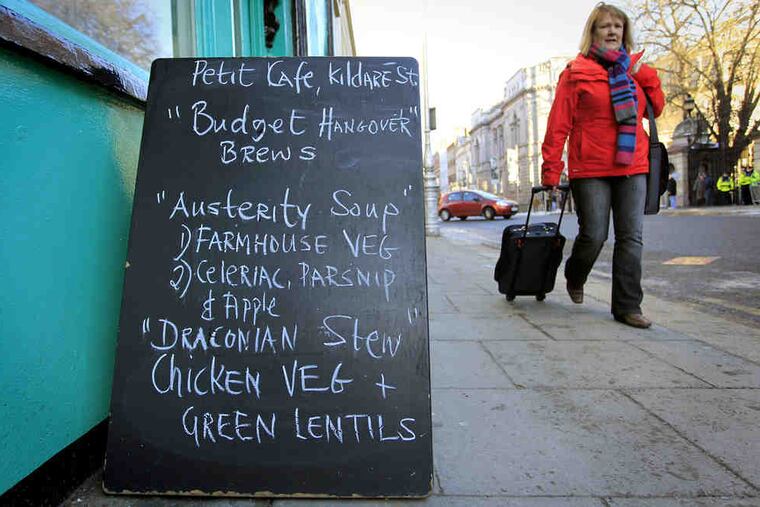Bitter Irish medicine
DUBLIN, Ireland - A defiant Irish Prime Minister Brian Cowen vowed Wednesday to push through Europe's toughest slash-and-tax budget in the face of voter fury and then defy the odds to win reelection despite a debt disaster that has shaken the entire eurozone.

DUBLIN, Ireland - A defiant Irish Prime Minister Brian Cowen vowed Wednesday to push through Europe's toughest slash-and-tax budget in the face of voter fury and then defy the odds to win reelection despite a debt disaster that has shaken the entire eurozone.
Cowen mounted a vigorous defense of his embattled leadership a day after Irish lawmakers narrowly backed a 2011 budget containing 6 billion euros ($8 billion) in cuts and tax increases that will take an estimated 3,000 euros ($4,000) per year out of average Irish households.
The unprecedented scale of the budget-tightening was a key condition of the European Union/International Monetary Fund bailout for Ireland of 67.5 billion euros ($90 billion). The money is to help Ireland cover its European-leading budget deficit and revive its debt-stricken banks. The Irish were forced to take aid after its two-year struggle to prevent the collapse of Dublin banks proved impossible to finance on their own.
Cowen - whose public approval ratings have recently fallen to a record-low 8 percent - insisted he would not resign, as many lawmakers have expected, and instead would lead his party into an early spring election. All recent polls suggest Cowen's long-ruling Fianna Fail party faces decimation in any national test.
The initial passage Tuesday of the Irish budget package offered temporary relief for the 16-nation eurozone, where Portugal, Spain, and Italy have faced mounting questions about their own capacity to keep financing their own debt mountains. European and IMF chiefs sought a bailout for Dublin, in part, to stem investor fears of a debt-default domino effect.
Wednesday's yields on 10-year bonds were little changed for the eurozone members rated most at risk of an eventual default, particularly Greece, which in May became the first eurozone member to be saved from bankruptcy.
The most significant mover was Germany, whose benchmark bonds suffered a moderate selloff, driving their 10-year yields above 3 percent for the first time since May's Greek crisis. Traders said the selling reflected investors' increased appetite for higher-risk bonds vs. the Germans' top-rated and consequently low-yielding debt securities.
Ireland's budget faces a series of parliamentary tests this week through February. Losing any single vote would force Cowen from office and Ireland into a snap election. Cowen won Tuesday's initial votes with the premier's two-vote majority solid.
Cowen said he was confident that, as the election day neared, voters would not be convinced by opposition leaders' claims they could reduce Ireland's deficit without enacting the same brutal cuts and tax rises as the government.
But grassroots anger over Fianna Fail's mismanagement of the economy was evident as Cowen's finance minister, Brian Lenihan, fielded live telephone calls Wednesday from citizens on RTE, Ireland's national radio and television network.
"Will you struggle to pay your mortgage? Will you struggle to take care of your family?" asked one caller, who identified himself only as a Dublin hospital worker named Brian who expected to lose 2,000 euros from his net household pay next year because of higher taxes.